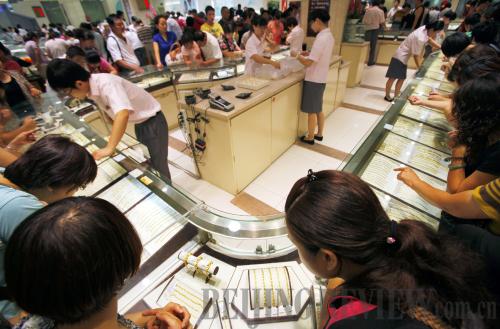|
 |
|
GOLD FEVER: Consumers flock into the Beijing Caishikou Department Store, the largest gold jewelry retailer in the city, to buy gold jewelry, to seek safety amid runaway inflation (WAN XIANG) |
While worries proliferate that China's tightening efforts to quell stubborn inflation may trigger a sharp slowdown of the domestic economy, another unforeseen calamity occurred in the developed world.
For the first time in history, the credit rating firm Standard & Poor's downgraded the rating on U.S. sovereign debt to AA-plus, sending a chill through global financial markets.
A compromise deal to raise the U.S. debt ceiling has soothed default worries, but fears are taking hold that fragile U.S. growth and the European debt crisis may push the world back into recession.
If external demand turns even more lackluster, Chinese exporters will have no place to hide. Many economists believe such a gloomy export outlook would lead China to stop its tightening measures.
"Clouds are already gathering, although a double-dip is unlikely," said Dong Tao, an economist with Credit Suisse. "July probably marked the peak in inflation, giving Beijing some room for monetary easing to cushion the blow of falling external demands."
China is likely to slightly adjust its credit structure in the future and its monetary policy will be "directionally loose," he said.
"We had anticipated a hike in interest rates as a result of higher inflation in July," said Shen Minggao, chief economist for Greater China, Citigroup Inc.
"However, the downgrade of the U.S. sovereign credit rating and the ensuing global financial market turmoil has significantly increased downside risk to the global economy," he said.
"Policymakers in China will likely be very cautious in such an uncertain environment, especially given the experience in 2008 when the United States started to cut rates and China still continued monetary tightening."
Ba Shusong, Deputy Director of the Research Institute of Finance at the Development Research Center of the State Council, also said the government must stay alert on the risk of over-tightening.
"China's present monetary environment is almost as tight as in 2007, and the economic foundation is shakier than four years ago," said Ba.
China's consumer inflation rate escalated to 6.5 percent in July, the highest level in three years and well above the government's target of 4 percent for this year.
The government has taken a prudent monetary stance this year, bidding farewell to the moderately loose policy adopted to counter the financial crisis. The People's Bank of China, the central bank, has ordered banks to raise the interest rates three times and increased the reserve requirement ratio six times so far this year.
Between August 2006 and December 2007, the central bank raised interest rates seven times to tackle soaring inflation, and it relaxed its monetary stance at the end of 2008, when the economy felt the pinch of the global credit contagion.
Growth woes
While Chinese policymakers have been pushing all the buttons to tame inflation, the tightening measures have inflicted a toll on the economy. Smaller firms have borne the brunt of the heavy blow as commercial banks shut them out of the loan market to avoid lending risks. The plight of financially strained smaller businesses is a serious concern for policymakers as small and medium-sized enterprises (SMEs) create more than 80 percent of jobs in the country.
Newspapers are filled with reports of massive factory closures and job losses in east coastal Zhejiang Province, a hotbed of private businesses.
The financing stress has forced many Zhejiang SMEs to turn to underground banks, triggering higher debt risks.
The purchasing managers index (PMI), a barometer of manufacturing activities, for small enterprises stood at 46.4 percent in July, the third consecutive month below the boom-and-bust line of 50 percent, said the China Federation of Logistics and Purchasing (CFLP). A reading below 50 percent indicates economic contraction.
| 